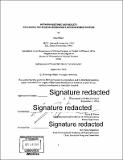Between rhetoric and reality : explaining the Russian Federation's nuclear force posture
Author(s)
Oliker, Olga
DownloadFull printable version (34.27Mb)
Other Contributors
Massachusetts Institute of Technology. Department of Political Science.
Advisor
Barry R. Posen.
Terms of use
Metadata
Show full item recordAbstract
This dissertation proposes and evaluates the performance of three theories that aim to explain Russia's nuclear force posture choices since the collapse of the Soviet Union. Two are rooted in concepts of inter-state competition. Of these, one begins with a central hypothesis that nuclear weapons, being more destructive than other weapons, are sufficient to deter a broad range of threats and will be preferred for doing so. The second argues that nuclear weapons contribute to a state's overall power and prestige, but are not sufficient to define it. They are preferred to deter nuclear, but not conventional, threats. The third theory postulates that strategic culture shapes which government actors will be most successful at garnering resources, resulting, in Russia's case, in a proclivity for offensive, ground-based weapons. I develop these theories and test them against the reality of Russia's nuclear rhetoric and force structure from 1992-2012. I find strongest support for the explanation rooted in cultural and bureaucratic factors. However, this theory predicts only force structure. In contrast, the theory that predicts states will treat nuclear weapons as one contributor to power and prestige appears to successfully predict Moscow's declaratory policy, but not its force structure (except between 2009 and 2012, when force structure is compatible with both this theory and the culture and bureaucracy theory). My analysis indicates that cultural and bureaucratic factors appear to play an important role in Russia's force structure choices, and help explain a continued emphasis on silo-based systems. Systemic factors appear crucial to Russian declaratory policy, but their impact on force structure is less pronounced, with the exception of Russia's desire for prestige driving larger force size. The divergence between declaratory policy and force structure is a notable finding not predicted by my theories (although allowed for by the culture and bureaucracy theory). Finally, I hope that with my culture and bureaucracy theory, I have proposed a useful way forward in operationalizing cultural factors for testing and analysis.
Description
Thesis: Ph. D., Massachusetts Institute of Technology, Department of Political Science, 2016. Cataloged from PDF version of thesis. Includes bibliographical references (pages 317-351).
Date issued
2016Department
Massachusetts Institute of Technology. Department of Political SciencePublisher
Massachusetts Institute of Technology
Keywords
Political Science.